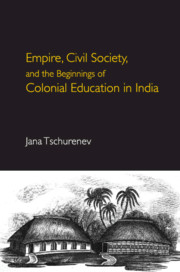Book contents
- Frontmatter
- Dedication
- Contents
- List of Figures
- List of Tables
- List of Abbreviations
- Acknowledgements
- Introduction: Empire Civil Society, and Educational Transformation in India
- 1 A Colonial Experiment in Education, Madras, 1789–1796
- 2 Education of the Poor, 1805–1813
- 3 Missionaries, Empire, and the Cause of Universal Education, 1792–1824
- 4 Race, Class, and Gender: The Social Agenda of Education, 1809–1830
- 5 Rules and Numbers: Transforming Rural Education, 1814–1830
- 6 Intellectual Conquest: Education Societies, ‘Useful Knowledge’, and the Bengal Renaissance, 1817–1854
- 7 Civil Society, Government, and Educational Institution-Building, Bombay Presidency, 1819–1882
- 8 Teaching the Marginalized: Universal Education and the Politics of Inequality, 1789–1937
- Conclusion: The Emergence of Public Elementary Schooling in an Imperial Frame
- Bibliography
- Index
6 - Intellectual Conquest: Education Societies, ‘Useful Knowledge’, and the Bengal Renaissance, 1817–1854
Published online by Cambridge University Press: 26 April 2019
- Frontmatter
- Dedication
- Contents
- List of Figures
- List of Tables
- List of Abbreviations
- Acknowledgements
- Introduction: Empire Civil Society, and Educational Transformation in India
- 1 A Colonial Experiment in Education, Madras, 1789–1796
- 2 Education of the Poor, 1805–1813
- 3 Missionaries, Empire, and the Cause of Universal Education, 1792–1824
- 4 Race, Class, and Gender: The Social Agenda of Education, 1809–1830
- 5 Rules and Numbers: Transforming Rural Education, 1814–1830
- 6 Intellectual Conquest: Education Societies, ‘Useful Knowledge’, and the Bengal Renaissance, 1817–1854
- 7 Civil Society, Government, and Educational Institution-Building, Bombay Presidency, 1819–1882
- 8 Teaching the Marginalized: Universal Education and the Politics of Inequality, 1789–1937
- Conclusion: The Emergence of Public Elementary Schooling in an Imperial Frame
- Bibliography
- Index
Summary
Europeo-native institutions … are destined to accomplish its moral and intellectual, as troops of this character have, the military conquest of this country. (Emphasis in original)
‘All Unite to Promote the Education of Children’
The previous chapter concluded that the number of students directly reached by missionaries’ schools in Bengal remained limited. Nevertheless, William Carey, Joshua Marshman, John Dorking Pearson, Robert May, and James Stewart left a deep and lasting impact on Indian education. In line with their popular Protestant orientation, the Serampore missionaries pursued a bottom-up approach to start the reformation of Bengal's society. From their mission commune, they aimed to spread rational, useful knowledge among the rural population. It is somewhat ironic, therefore, as David Kopf overserves, that eventually their educational reform programme ‘succeeded best among the children of the Hindu elite in the metropolis of Calcutta’.
In Calcutta, the missionaries found themselves joined by ‘benevolent and reflecting persons of every rank and condition. The British Governments and some of the Native Authorities, the Governor General, the Bishop of Calcutta, Chaplains, Missionaries, Military Officers, European Gentlemen and Ladies resident in India, and numbers of the rich Natives themselves’ – all seemed to ‘unite to promote the education of Children’.
Most importantly, British and Indian reformers cooperated in the Calcutta School Book Society (CSBS), and its sister project, the Calcutta School Society (CSS). Founded in 1817 and 1818, respectively, both associations rested on a temporary alliance of the same missionaries whose school projects we have encountered in the last chapter with the British Orientalists in the General Committee of Public Instruction (GCPI, 1824), and a strong faction among Calcutta's bhadralok, or ‘gentlefolk’. Radhakanta Deb (1783–1867) and his associates, who later formed the Dharma Sabha in defence of Bengali Hindus’ cultural identity, were among the leading members of the CSS and the CSBS. The CSBS did not only represent a novel kind of British–Indian civil society cooperation, which opened the way for remarkable processes of cultural appropriation. It also became an important hub in the network of education reformers in Calcutta and in a pan-Indian perspective. A visualized summary of these connections is provided in Figure 6.1. The organizational model of the CSBS was copied by education societies in several parts of British India, including the Madras School Book and School Society (MSBSS) and the Bombay Native Education Society (BNES).
- Type
- Chapter
- Information
- Publisher: Cambridge University PressPrint publication year: 2019



